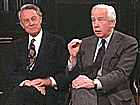
May 29, 1996
JIM LEHRER: But is that a character trait, pragmatism?
ROBERT DALLEK: Absolutely. Absolutely. You look at Herbert Hoover. Herbert Hoover was a man of genuine, fine character, but he lacked practical political sense. And he couldn't bend and shift and change with the requirements of the time. And he was a ruined President, because he was such a, I think, stiff-backed ideologue. And I think that speaks volumes about his character.
 JIM LEHRER: Steve Ambrose, how would you draw the correlations, either in general terms or any specific terms, between whether a President was a good person in personal terms but a lousy President, or a lousy person in personal terms, but a great President, in terms of character alone?
JIM LEHRER: Steve Ambrose, how would you draw the correlations, either in general terms or any specific terms, between whether a President was a good person in personal terms but a lousy President, or a lousy person in personal terms, but a great President, in terms of character alone?
STEPHEN AMBROSE: Well, I don't, myself, think that any of the Presidents who have a personal character that has become a subject of public debate and contention and exposure can lead successfully. If you can manage to cover up a private life that is less than the majority would want the president to have -- Franklin Roosevelt -- it's not going to matter much.
I don't think it mattered very much that Franklin Roosevelt wasn't the most of loyal of husbands. It seems to me to hardly have affected his career at all. Jack Kennedy is another matter all together, where the womanizing, I think, did affect the Presidency and affected the kind of risk that he was willing to take.
That is, Kennedy was a man who took a lot of risk in his private life and the Cuban Missile Crisis was the biggest risk we took in the cold war. And I think the two go together. This isn't to say that Kennedy was wrong in the Cuban Missile Crisis. It is to say that he was willing to take risks that I don't think some of his predecessors -- certainly Ike -- would have been a lot slower to take.
JIM LEHRER: Ben Bradlee?
 BEN BRADLEE: Well, the rules changed didn't they-- in the middle of -- uh -- I mean, what interests everybody now about Kennedy did not interest them, as I remember history, during Kennedy's administration, and they sure as heck didn't -- I mean, mention a casual mention of a person in Eisenhower's life. It had no -- it cast no shadow on history that I could see at the time or now and the same with Roosevelt.
BEN BRADLEE: Well, the rules changed didn't they-- in the middle of -- uh -- I mean, what interests everybody now about Kennedy did not interest them, as I remember history, during Kennedy's administration, and they sure as heck didn't -- I mean, mention a casual mention of a person in Eisenhower's life. It had no -- it cast no shadow on history that I could see at the time or now and the same with Roosevelt.
DAVID MCCULLOUGH: I think we really need to more about people who aspire to the office, how they have handled defeat in their life. I think if you take a look at these very effective Presidents, really strong leaders, they are, after all, the person at the helm -- and if they've been through defeat -- not that they lost or that -- how did they react to it. That's what's so marvelous about Reagan's response to being shot.
And with Kennedy I think an enormous part of his appeal, both as a leader and as an America hero, was that he had been through hell. And it didn't seem to turn him sour. I think there's certain qualities we don't like, we Americans, and I think it's consistent. One is hypocrisy, unless it's done with a kind of style, a kind of humor, because Roosevelt could get away with it.
[LAUGHTER]
JIM LEHRER: Stylish hypocrisy.
DAVID MCCULLOUGH: We don't like -- we don't like self-pity and the whining President, the President who's saying woe is me, look how I'm suffering and so forth, that doesn't work.
 ROBERT DALLEK: David, I think FDR is the best example of what you're talking about. Here was a man who was paralyzed from the waist down by polio and the country identified with him. In this time of crippling economic disability, there weren't a lot of photographs of his disability. People -- the photographers, the press were very respectful of his privacy in that regard.
ROBERT DALLEK: David, I think FDR is the best example of what you're talking about. Here was a man who was paralyzed from the waist down by polio and the country identified with him. In this time of crippling economic disability, there weren't a lot of photographs of his disability. People -- the photographers, the press were very respectful of his privacy in that regard.
But people knew. They knew this man had overcome this terrible disease and he inspired the country to feel that it could overcome the Depression. So, I think there was a very powerful psychological connection to the man's character there.
HENDRIK HERTZBERG: Well, I think there's a -- there's a kind of vulgar Freudianism -- a relatively recent development -- whereby we see a person's private life as a sort of philosopher's stone that will tell -- will reveal the truth about their public life. I think for almost all -- for virtually all of these Presidents, you can discern their character from their public life. You don't need to know -- you don't need to know the secrets that are in the closet.
And in the case of the private lives of Kennedy and Roosevelt and so on, because they had mistresses, what -- it really -- what it really has to do with is what -- is the changing definition of what's public and private.
They were -- both Roosevelt and Kennedy were married men, who -- whose marriages seemed to work and -- uh -- since there was more respect for the institution of marriage in those days, a marriage -- the public side of the marriage wasn't seen nearly as -- as the reflection of the private side. And if the two didn't mesh, that meant that the public side was invalid.
There was a certain respect given to the public side, to marriage as an institution, so that -- so that FDR and Kennedy, because they appeared to be good husbands and fathers, they were good husbands and fathers, by the definition of the time. We have a different definition now.
 JAMES CANNON: And because of that the press now and henceforth is going to pay a lot more attention to it. And if they do and they find a personal flaw, it's going to make a major difference in A.) whether this guy's ever going to get elected; and, B.) whether he can be an effective President. We have to have confidence on our President as a personal guy or we -- we are going to be lost without him.
JAMES CANNON: And because of that the press now and henceforth is going to pay a lot more attention to it. And if they do and they find a personal flaw, it's going to make a major difference in A.) whether this guy's ever going to get elected; and, B.) whether he can be an effective President. We have to have confidence on our President as a personal guy or we -- we are going to be lost without him.
JIM LEHRER: Is it a valid -- is it a valid test of character?
JAMES CANNON: Yes, I think it is, it is now. It didn't used to be, but it is now.
BEN BRADLEE: Fidelity?
PEGGY NOONAN: Oh, no.
JIM LEHRER: Any kind of personal -- you're talking about --
JAMES CANNON: Basically, I'm talking about, marital fidelity, because that is what is the target now of the press in focusing on presidential candidates or all too often it is anyway.
DAVID MCCULLOUGH: I think it depends on whether the individual character is being sanctimonious about his own purity and then is discovered to be not so pure after all.
BEN BRADLEE: Well, that's a question of lying.
DAVID MCCULLOUGH: And then tries to -- to either conceal it or be ambivalent and then we don't like that.
I think we're a very forgiving country. I think if Nixon had gone before the country and said, I did this and it was wrong and I'm sorry and it was a mistake and we're going to straighten it out, he would have remained in office.

But I think -- there's one other ingredient that I feel very strongly must belong in this equation and that's a sense of humor. Because a sense of humor is also a reflection on one's character, because it -- it's really a way of saying I'm not taking myself or my little time in this office overly seriously and that I am still a member of the human race and I'm still understanding that none of us are perfect and we're not going to do everything perfectly and we have to get through this with humor.
And you see it in Lincoln and you see it, certainly, in Jack Kennedy and in Reagan and Truman. And those that don't have it, have a hard time in that job. For one thing they can't take the punishment without it. They need that relief.
PEGGY NOONAN: They lack the irony and the detachment and the sense that they understand life. If you understand life, you are funny.
[LAUGHTER] You do laugh a lot, you know.
You do laugh a lot, you know.
ROBERT DALLEK: Johnson had a terrific sense of humor.
BEN BRADLEE: What? What!?
ROBERT DALLEK: Oh, yes. Oh, yes. Let me tell you about 200 jokes.
PEGGY NOONAN: Did he have wit? Didn't he have conversational quick wit?
ROBERT DALLEK: He had conversational wit, he had humor, he had repartee. German Chancellor visited him on his ranch, Ludwig Ehrhardt, and he said, Mr. President, I understand you were born in a log cabin. Johnson said, no, no, you have me confused with Abe Lincoln. I was born in a manger.
[LAUGHTER]
ROBERT DALLEK: In talking about his gravesite, he said, boys, don't dig it too deep, I only expect to be in there for three days. Now, it spoke to his grandiosity ...
PEGGY NOONAN: Yeah [laughter]
ROBERT DALLEK: ... and that's what I think, you see, ruined him with --
PEGGY NOONAN: I go with that.
ROBERT DALLEK: -- ruined him with his -- with Americans, that people saw him as larger than life. They never saw him as one of us.
 HERZBERG: I think these qualities are almost all overrated, humor and all of them. And it depends on -- it depends on the results. I was at Harvard actually when LBJ became President. We worshipped him. We worshipped him as -- we worshipped all those cowboy traits. You know, he was so much -- he had so much more life and spirit than us desiccated Ivy Leaguers.
HERZBERG: I think these qualities are almost all overrated, humor and all of them. And it depends on -- it depends on the results. I was at Harvard actually when LBJ became President. We worshipped him. We worshipped him as -- we worshipped all those cowboy traits. You know, he was so much -- he had so much more life and spirit than us desiccated Ivy Leaguers.
[LAUGHTER]
HERZBERG: It was the war in Vietnam that turned us against him. It was the real thing. And if it hadn't been for that, he'd be celebrated and his qualities would be celebrated as -- as unique and indispensable to being a great president.
JIM LEHRER: Steve Ambrose, should the average voter -- trying to decide between or among candidates for President, say, okay, I want to now judge the character of this person and how do you go about doing that.
STEPHEN AMBROSE: I think they do it all the time. I think that's what happened to Gary Hart, for example. How do they go about doing it, everybody does it on their own basis --
JIM LEHRER: It's an automatic human thing to do.
STEPHEN AMBROSE: Of course, and to many people marital fidelity is tremendously important. To others, an increasing number in our society it's not so important. The program that the man is advocating is a reflection of his character his concern for others, his concern for his own party and who's he shoving aside on his way to the top, who is he being loyal to.
This is a part of the mix too. How important it is in getting elected to have a good character depends on the time and the place and the circumstances. And we've elected some very bad ones. I was thinking -- we were talking about this, about the famous Blaine-Cleveland campaign --
JIM LEHRER: You're going to have to refresh our memory on that one.
 STEPHEN AMBROSE: Well, Cleveland had an illegitimate daughter. And James G. Blaine had an exemplary private life. Blaine was more or less a thief in the Senate. Cleveland, as President that first time around, had had a scandal free and fairly successful administration. So, people said, well, send Blaine home where he fits so well --
STEPHEN AMBROSE: Well, Cleveland had an illegitimate daughter. And James G. Blaine had an exemplary private life. Blaine was more or less a thief in the Senate. Cleveland, as President that first time around, had had a scandal free and fairly successful administration. So, people said, well, send Blaine home where he fits so well --
[LAUGHTER]
STEPHEN AMBROSE: Put Cleveland back in the White House where he does such a good job.
TOM WICKER: I would take issue a little bit, if I may, Steve, but with the idea that people are constantly judging character. I think that's a contemporary idea. I -- I believe most studies show, do they not, that up until relatively modern times, people made a choice between Republicans and Democrats. And that's about all they knew. My father was a Yellow Dog Democrat. And he would have never thought of voting for a Republican, didn't matter who it was.
So, I think the question of trying to judge people's character, judge individuals and choose between them, has come about probably with radio and certainly with television, with modern times so to speak. And it's fairly easy in a case like Gary Hart who convicted himself almost. It's not so easy in circumstances where you don't have an open and shut case like that.
HENDRIK HERTZBERG: I think it's really a symptom of the depoliticization of politics, this emphasis on character, which, as you pointed out, is much stronger now than it was a generation ago, or 50 or 100 or 150 years ago, because people don't feel that direct sense of connection I think between what happens politics and what happens in their own lives.
And they're unmoored politically. That's why we can have these wild crazy swings back and forth in the popularity of candidates, because if that popularity were moored to a political view, a view of the world in our minds, you couldn't have that kind of swing. You'd have a -- the swings would be much narrower and much more meaningful.
PEGGY NOONAN: I think we're getting a little carried away here myself. I think -- I think every four years we pick a President based essentially on ideas. You've got two or three guys, they've come forth, they've got positions and ideas and people have a tendency to vote on serious ideas and positions and they hope the guy who is speaking for those ideas and positions is someone they can manage to like, because if he wins, for the next four years, he's going to be in their face. 
He's there all the time, an American President now. If you put on your TV, he's there. If you put on the radio, he's there. He might as well be -- be following you like Sherlock Holmes. You cannot escape him.
If you cannot escape him, you have -- of course, you absorb a sense of who he is as a human being and you can also see who he is as a human being, reflected in his positions, his policies, his strategic decisions, his tactical decisions.

| Welcome | Broadcast | Essays | Forum | Quotes | Links | Home